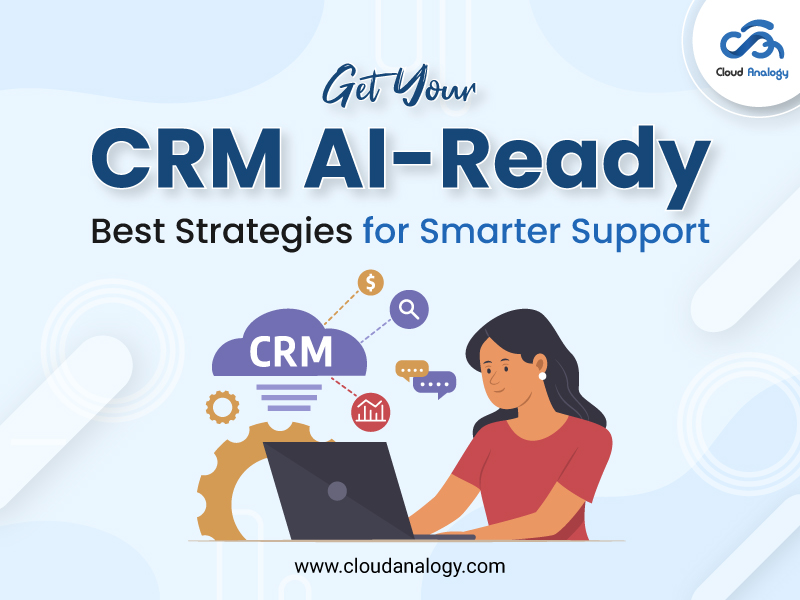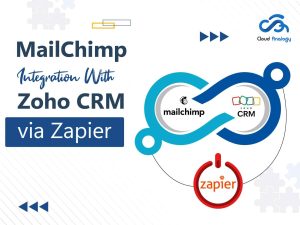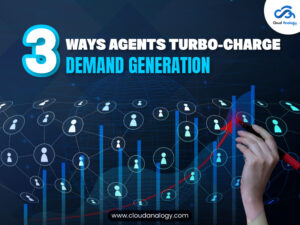Sharing is caring!
Modern consumers don’t just want efficiency—they expect proactive and personalized engagement than ever before. Businesses need their CRM systems to be more than a database and do more than store contact information—they must power intelligent automation, deliver actionable insights, and enable seamless customer experiences.
Yet, many organizations struggle to harness the full potential of their customer support tools.
The Cloud Analogy team, experts in Salesforce consulting services, has firsthand experience in helping companies transform fragmented CRM systems into AI-ready platforms that empower employees and delight customers.
In this blog, we’ll explore proven strategies to make your CRM AI-ready, enabling smarter, more personalized, and efficient customer support.
The Challenge of Disconnected Tools
Disconnected systems remain a major obstacle for businesses striving to deliver seamless customer experiences. Customers now expect hyper-personalized interactions across every touchpoint, but when support tools operate in silos, meeting these expectations becomes tough.
Some common challenges include:
1. Fragmented workflows: Support agents must navigate multiple platforms to resolve even simple queries, slowing response times.
2. Repeated customer interactions: Without a unified system, customers often need to repeat their information across departments.
3. Lack of collaboration: Sales, marketing, and support teams struggle to share insights, resulting in an incomplete view of the customer.
Additionally, fragmented systems hinder the adoption of AI. Without centralized, accurate data, automation and predictive analytics cannot function effectively, limiting an organization’s ability to provide intelligent, proactive support.
Unified CRM Solutions: Leveraging Salesforce for Smarter Support
Salesforce offers a unified CRM platform that centralizes customer data, interactions, and workflows, providing a strong foundation for intelligent automation. By consolidating these elements into a single system, businesses can enable AI to deliver personalized experiences, automate repetitive tasks, and generate accurate insights for better decision-making.
The benefits of a unified Salesforce platform are clear. Staff can work more efficiently with all necessary information in one place, while supervisors gain real-time visibility into team performance and workflow progress. Features such as integrations, macros, and knowledge-sharing tools streamline operations, ensuring agents have the resources they need at their fingertips.
Furthermore, Salesforce supports scalable, AI-powered automation, allowing organizations to handle high-demand periods seamlessly and maintain consistent, high-quality customer experiences.
Top 4 Strategies for AI-Driven Smarter Support
Strategy 1: Observe to Empower
An AI-ready CRM begins with understanding employee-customer interactions. Observing workflows across departments can uncover inefficiencies such as:
- Time-consuming tasks that slow support responses
- Navigating multiple systems for single inquiries
- Dispersed or incomplete knowledge repositories
Implementing solutions like pre-configured quick replies, macros for repetitive tasks, and centralized knowledge bases helps reduce effort, streamline workflows, and improve response consistency. This approach ensures the CRM empowers employees rather than adding unnecessary complexity.
Strategy 2: Keep the CRM Lean and Scalable
Over time, CRMs can accumulate redundant features, outdated data, and inefficient workflows. Regular pruning ensures the system remains efficient and scalable. Best practices include:
- Removing unused fields, workflows, and integrations
- Auditing data to eliminate redundancy or obsolescence
- Updating features to match evolving business processes
A lean CRM enables AI tools to operate effectively, providing accurate insights and automation without being hindered by clutter or outdated configurations.
Strategy 3: Build a Dedicated CRM Team
A CRM is an evolving system, not a one-time project. Dedicated teams are essential to manage, optimize, and scale the platform. Key recommendations include:
Clearly define roles for CRM architects, developers, analysts, admins, and business stakeholders to prevent gaps in expertise.
- Balance internal development with external consultants to leverage specialized skills.
- Structure the team to support scalable operations as the organization grows.
- A well-organized CRM team ensures continuous feature rollout, smooth adoption across business units, and long-term AI-readiness.
Strategy 4: Engage Customers Through Their Preferred Channels
Modern customers expect to interact across multiple channels—email, chat, SMS, social media, WhatsApp, and voice. Disconnected channels can frustrate users and limit the effectiveness of AI-driven insights.
To maximize engagement and maintain context:
- Integrate all customer-preferred channels within the CRM.
- Ensure seamless interactions so customers don’t repeat themselves.
- Use AI-driven automation and chatbots to enhance, not replace, human support.
- Tailoring channel strategy to customer behavior ensures richer data for AI and more satisfying experiences for users.
Building an AI-Ready Foundation With Cloud Analogy
Implementing AI in customer support is not just about adopting new technology—it requires a strategic foundation. We, as a leading Salesforce consulting partner, focus on an AI-ready CRM that must:
- Consolidate fragmented tools into a single, unified platform.
- Optimize workflows and knowledge sharing.
- Maintain a scalable, clean CRM environment.
- Support dedicated teams that evolve the system continuously.
- Integrate customer-preferred channels intelligently.
By following these strategies, businesses can effectively leverage Salesforce consulting companies, ensuring AI implementation drives real value rather than compounding fragmentation.
Conclusion
Getting your CRM AI-ready is a journey that combines technology, process, and people. The right foundation enables automation, personalization, and efficiency at scale.
Organizations aiming to unlock AI’s full potential in customer support should focus on building a unified CRM, pruning unnecessary complexity, fostering a dedicated CRM team, and engaging customers through their preferred channels. Partnering with Salesforce consulting services experts can ensure a smooth transition, a tailored strategy, and long-term success.With the right approach, any business can transform its CRM from a fragmented system into a strategic engine for smarter support, improved customer experiences, and AI-driven growth. Hire Cloud Analogy, the best Salesforce Consulting Partner now!
Frequently Asked Questions (FAQs)
Salesforce consulting services provide expert guidance to unify fragmented systems, optimize workflows, and implement AI-powered automation for scalable customer support.
Top Salesforce consulting firms offer strategic consulting, implementation, and continuous optimization rather than just one-time deployments.
A CRM is not a one-time project. A dedicated team & a Salesforce consulting partner ensure continuous improvement, adoption across departments, and readiness for AI-driven capabilities.
Salesforce consulting services help organizations streamline workflows, integrate channels, implement AI automation, and maintain a scalable CRM tailored to business needs.
Salesforce consulting partners ensure CRMs stay clean, lean, and scalable by auditing data, removing redundancies, and aligning system architecture with growth needs.










